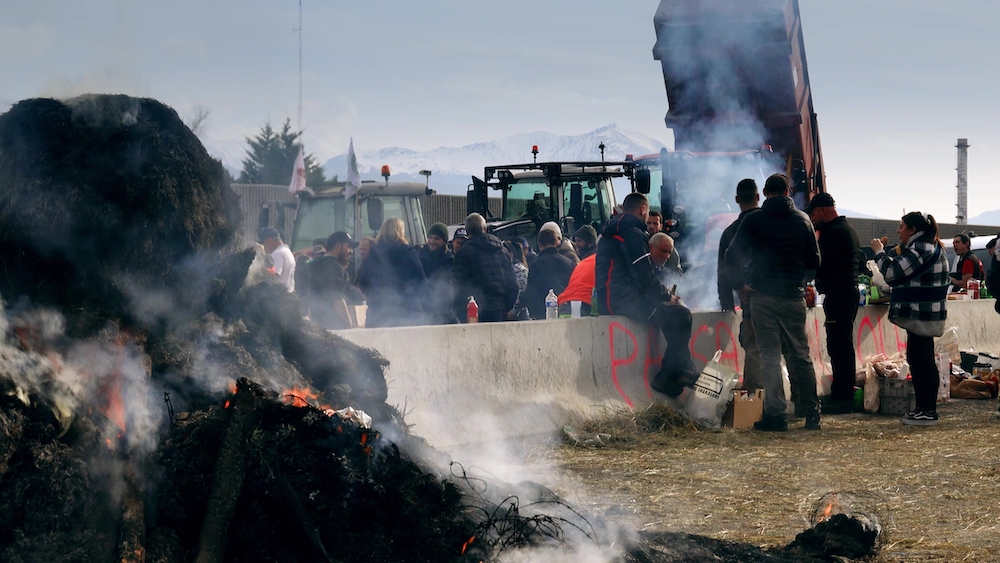French farmers’ angry, sometimes violent protests over the past fortnight in blocking major highways across the country, as they push to obtain better working conditions, has placed the European Union’s agricultural policy firmly under the spotlight while also reviving a nationalistic and protectionist outlook on trade.
Unrest has also taken place in Germany, Poland, Romania, and Belgium but it is in France where the protests have been most virulent.
Today, convoys of tractors from across France will converge on Paris with the aim of blocking the world’s largest wholesale market of fresh produce, Rungis, and disrupting food distribution in France’s premier economic region which totals around 12 million inhabitants. Action is also being stepped up to block roads in French regions too.
France is the biggest agricultural producer in the bloc of 27 member states and its farmers receive the largest share of EU subsidies – just over €9 billion (US$9.8 billion) per year over the period 2023-2027 – which works out at 17% of the total agricultural budget allocated.
However, despite, on the face of it, such substantial public aid, French farmers, mostly small holders, claim they are unable to earn a living wage as a result of being weighed down by too much bureaucracy and regulation, particularly with regard to environmental protection.
They are opposed to the EU’s subsidy rules, and in particular, an incoming measure to leave 4% of farmland fallow, and also to what they consider to be France's zealous adoption of the EU’s green policies, one example being the restoration of hedges which alone are subject to some 14 different regulations!
They also argue that the drive by the government and retailers to lower food inflation has done little to help their plight, many of whom complain they continue to be squeezed by high prices on fuel, fertilizer, and transport.
Farmers point the finger too at unfair competition from cheaper imports. Ukraine is a prime example, with a significant volume of its produce entering the EU, quotas and duties having been waived since the Russian invasion.
French farmers are also concerned that a trade deal between the EU and Mercosur, the South American bloc, would expose European producers to cheap imports such as sugar, grain, and meat. They highlight too that Mercosur producers do not meet the environmental standards that EU farmers must comply to.

‘Economic Patriotism’ and the Single European Market
But French farmers are also targeting what they consider to be unfair competition much closer to home — from other EU states — which they believe is partly responsible for the difficulty they find themselves in. So much for the Single European Market……
Economic patriotism — ‘produce French and consume French’ — is gathering momentum to the dismay not only of the government but of France’s EU partners too.
There have been numerous cases of French farmers intercepting foreign-registered trucks carrying EU-produced fresh fruit and vegetables, notably Spanish and emptying loads of onto the road.
Earlier this week, farmers blocked two logistics hubs of retail chain located in northern France stopping trucks transporting food products. They confiscated a pallet of condensed milk made in the Netherlands, marketed under the retailer’s brand, and which they ‘donated to charity.
One of the farmers present commented: “Today, there are enough milk producers locally to produce French condensed milk. My cooperative produces condensed milk. We’re just scraping a living, trying to survive, cutting costs, scrounging euros left and right and here we have foreign milk entering France.”
So far, the only concrete concession made to the farmers by the government is to maintain a tax break on diesel fuel which was due to be phased out. However, there has also been a commitment to cut red tape and speed up the process of receiving subsidies.
However, wary of the farmers’ protests intensifying, France has been being active at EU level. For example, it is pushing its European partners to agree to an easing of regulations on fallow farmland.
It is also calling for measures to prevent imports of commodities such as sugar, poultry, and eggs from Ukrainetriggering the destabilization of markets in the EU.
President Macron has also made it clear that it is impossible to conclude a trade deal negotiations with the Mercosur bloc.
At an upcoming summit meeting of EU leaders, the farmers protests will very likely be a high on the agenda.
Meanwhile, French farmers are maintaining their pressure on the Macron administration who they continue to criticize for a lack of tangible action, particularly on the issue of the disparities in agricultural standards across Europe and inadequate financial support proposals.
To date, the French authorities have advised law enforcement agencies to avoid clashes with farmers but Interior minister, Gérald Darmanin, has warned that a so-called ‘siege of Paris’ today will not be allowed to go ahead.
15,000 police officers and gendarmes are mobilized, supported by armored vehicles and helicopters, are in position to prevent tractors from blocking the Rungis market and Paris’ main airports, Roissy and Orly.
The outcome of today’s action remains uncertain, but the farmers are determined, and the French government and the EU are under pressure to act.

Follow us on social media: